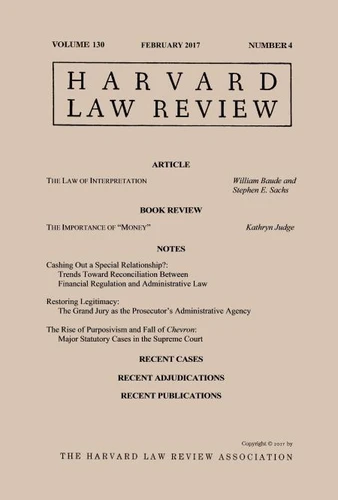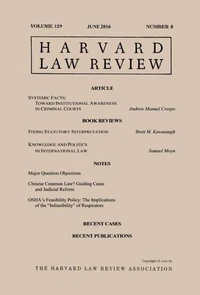Harvard Law Review: Volume 130, Number 4 - February 2017
Par :Formats :
Disponible dans votre compte client Decitre ou Furet du Nord dès validation de votre commande. Le format ePub est :
- Compatible avec une lecture sur My Vivlio (smartphone, tablette, ordinateur)
- Compatible avec une lecture sur liseuses Vivlio
- Pour les liseuses autres que Vivlio, vous devez utiliser le logiciel Adobe Digital Edition. Non compatible avec la lecture sur les liseuses Kindle, Remarkable et Sony
 , qui est-ce ?
, qui est-ce ?Notre partenaire de plateforme de lecture numérique où vous retrouverez l'ensemble de vos ebooks gratuitement
Pour en savoir plus sur nos ebooks, consultez notre aide en ligne ici
- FormatePub
- ISBN978-1-61027-785-3
- EAN9781610277853
- Date de parution03/02/2017
- Protection num.pas de protection
- Infos supplémentairesepub
- ÉditeurMark Childress
Résumé
The February 2017 issue, Number 4, features these contents:. Article, William Baude & Stephen E. Sachs, "The Law of Interpretation". Book Review, Kathryn Judge, "The Importance of 'Money'". Note, "Cashing Out a Special Relationship?: Trends Toward Reconciliation Between Financial Regulation and Administrative Law". Note, "Restoring Legitimacy: The Grand Jury as the Prosecutor's Administrative Agency".
Note, "The Rise of Purposivism and Fall of Chevron: Major Statutory Cases in the Supreme Court"Furthermore, student commentary analyzes Recent Cases on: abstaining from adjudicating habeas petition of Guantanamo detainee tried by military commission; a Second Circuit ruling that the Terrorism Risk Insurance Act, but not the FSIA, allows recovery against U. S. companies owned by state sponsors of terrorism; whether using another employee's password falls under the Computer Fraud and Abuse Act; and whether government acquisition of historical cell-site location information is a Fourth Amendment search.
Two Recent Adjudications are examined, one in which the NLRB ruled that student assistants at private colleges and universities are statutory employees covered by the NLRA, the other under Dodd-Frank, in which the FSOC determined that a General Electric subsidiary is no longer a "systemically important financial institution." Finally, the issue includes several summaries of Recent Publications. The Harvard Law Review is offered in a quality digital edition, featuring active Contents, linked footnotes, active URLs, legible tables, and proper ebook and Bluebook formatting.
The Review is a student-run organization whose primary purpose is to publish a journal of legal scholarship. It comes out monthly from November through June and has roughly 2500 pages per volume. Student editors make all editorial and organizational decisions. This is the fourth issue of academic year 2016-2017.
Note, "The Rise of Purposivism and Fall of Chevron: Major Statutory Cases in the Supreme Court"Furthermore, student commentary analyzes Recent Cases on: abstaining from adjudicating habeas petition of Guantanamo detainee tried by military commission; a Second Circuit ruling that the Terrorism Risk Insurance Act, but not the FSIA, allows recovery against U. S. companies owned by state sponsors of terrorism; whether using another employee's password falls under the Computer Fraud and Abuse Act; and whether government acquisition of historical cell-site location information is a Fourth Amendment search.
Two Recent Adjudications are examined, one in which the NLRB ruled that student assistants at private colleges and universities are statutory employees covered by the NLRA, the other under Dodd-Frank, in which the FSOC determined that a General Electric subsidiary is no longer a "systemically important financial institution." Finally, the issue includes several summaries of Recent Publications. The Harvard Law Review is offered in a quality digital edition, featuring active Contents, linked footnotes, active URLs, legible tables, and proper ebook and Bluebook formatting.
The Review is a student-run organization whose primary purpose is to publish a journal of legal scholarship. It comes out monthly from November through June and has roughly 2500 pages per volume. Student editors make all editorial and organizational decisions. This is the fourth issue of academic year 2016-2017.
The February 2017 issue, Number 4, features these contents:. Article, William Baude & Stephen E. Sachs, "The Law of Interpretation". Book Review, Kathryn Judge, "The Importance of 'Money'". Note, "Cashing Out a Special Relationship?: Trends Toward Reconciliation Between Financial Regulation and Administrative Law". Note, "Restoring Legitimacy: The Grand Jury as the Prosecutor's Administrative Agency".
Note, "The Rise of Purposivism and Fall of Chevron: Major Statutory Cases in the Supreme Court"Furthermore, student commentary analyzes Recent Cases on: abstaining from adjudicating habeas petition of Guantanamo detainee tried by military commission; a Second Circuit ruling that the Terrorism Risk Insurance Act, but not the FSIA, allows recovery against U. S. companies owned by state sponsors of terrorism; whether using another employee's password falls under the Computer Fraud and Abuse Act; and whether government acquisition of historical cell-site location information is a Fourth Amendment search.
Two Recent Adjudications are examined, one in which the NLRB ruled that student assistants at private colleges and universities are statutory employees covered by the NLRA, the other under Dodd-Frank, in which the FSOC determined that a General Electric subsidiary is no longer a "systemically important financial institution." Finally, the issue includes several summaries of Recent Publications. The Harvard Law Review is offered in a quality digital edition, featuring active Contents, linked footnotes, active URLs, legible tables, and proper ebook and Bluebook formatting.
The Review is a student-run organization whose primary purpose is to publish a journal of legal scholarship. It comes out monthly from November through June and has roughly 2500 pages per volume. Student editors make all editorial and organizational decisions. This is the fourth issue of academic year 2016-2017.
Note, "The Rise of Purposivism and Fall of Chevron: Major Statutory Cases in the Supreme Court"Furthermore, student commentary analyzes Recent Cases on: abstaining from adjudicating habeas petition of Guantanamo detainee tried by military commission; a Second Circuit ruling that the Terrorism Risk Insurance Act, but not the FSIA, allows recovery against U. S. companies owned by state sponsors of terrorism; whether using another employee's password falls under the Computer Fraud and Abuse Act; and whether government acquisition of historical cell-site location information is a Fourth Amendment search.
Two Recent Adjudications are examined, one in which the NLRB ruled that student assistants at private colleges and universities are statutory employees covered by the NLRA, the other under Dodd-Frank, in which the FSOC determined that a General Electric subsidiary is no longer a "systemically important financial institution." Finally, the issue includes several summaries of Recent Publications. The Harvard Law Review is offered in a quality digital edition, featuring active Contents, linked footnotes, active URLs, legible tables, and proper ebook and Bluebook formatting.
The Review is a student-run organization whose primary purpose is to publish a journal of legal scholarship. It comes out monthly from November through June and has roughly 2500 pages per volume. Student editors make all editorial and organizational decisions. This is the fourth issue of academic year 2016-2017.






















